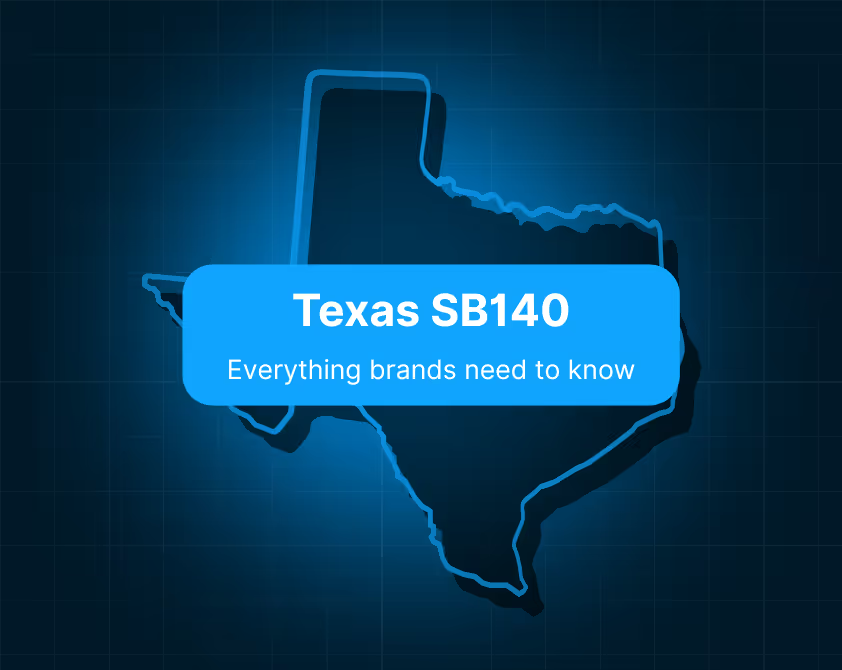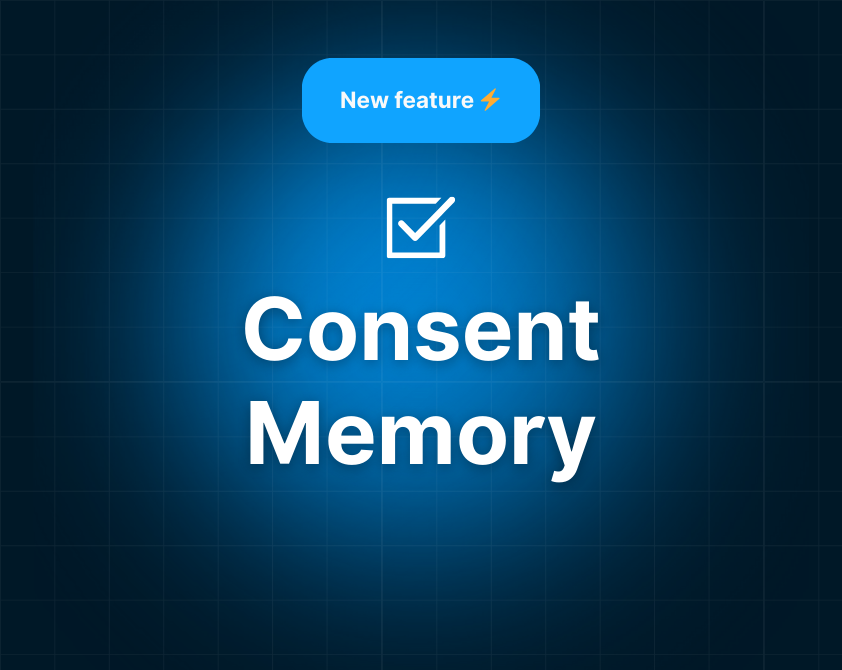Texas SB140: Everything brands need to know
UPDATE 9/29/2025
As of September 2025, ecommerce brands are exempt from Texas SB140. Registering with the state, acquiring a bond are no longer required. If you are operating a double opt-in consent-based SMS marketing program, Texas SB140 is no longer relevant for you. We will keep you updated as things change.
The Texas legislature has recently passed Senate Bill 140 (SB140), a law that makes big changes to how SMS and telemarketing campaigns are regulated in the state. This is sometimes referred to as the Texas ‘Mini-TCPA’, because it mirrors and expands upon the federal Telephone Consumer Protection Act (TCPA).
Below we break down what this means for brands, the risks involved, and what practical steps you should be taking now.
What is Texas SB140?
SB140 amends Texas telemarketing law to explicitly cover text messages (SMS). It overrides the Federal TCPA for the purposes of SMS solicitation and expands the definition of “telephone solicitation,” creates new liability pathways for brands, and gives individuals the ability to bring lawsuits under the state’s Deceptive Trade Practices Act (DTPA). Importantly, it introduces a registration requirement for brands sending promotional SMS communications to Texas residents, regardless of where the brand is located.
A consumer who feels they received a non-compliant marketing text in Texas may now have a clearer and more powerful legal route to sue.
What Risks Do Brands Face Under SB140?
1. Fines & Damages
- Individuals can recover damages for violations, ranging from approximately $500 to $10,000 per message (including attorneys fees)
- Penalties can multiply if multiple messages are sent to the same person.
- Successive recoveries (multiple lawsuits over time from the same individual) are explicitly allowed.
2. Lawsuits from “Professional Plaintiffs” & Attorneys
- Expect an increase in lawsuits from attorneys actively searching for technical violations.
- Similar to the federal TCPA, this law may attract litigants who monitor brands for slip-ups and file claims aggressively.
In Plain Language: What Do Brands Need to Do?
To comply with SB140, brands should:
- Register as soon as possible with the Texas Secretary of State Office, filing all necessary documentation and paying the $200 filing fee and putting aside a $10,000 security deposit (in the form of an irrevocable letter of credit, surety bond or equivalent security).
- Respect quiet hours. Violations may be enforced when SMS communications are sent during the following hours (Texas time/CDT):
- Monday-Saturday: No SMS communications from 9p.m. to 9a.m.
- Sunday: No SMS communications before 12p.m. and after 9p.m.
- Only send SMS messages to subscribers with clear, prior consent. Customers must have explicitly double opted in.
- Maintain proof of consent. Keep records of when and how consent was captured.Respect Do Not Call (DNC) lists. Even if you have consent, check against federal/state DNC lists.
- Exclude risky segments. Be careful about sending texts to Texas residents where consent is unclear or outdated.
- Review your messaging practices. No misleading, harassing, or excessively frequent messages.
What We’ll Be Watching For
While the law is already in effect, how courts interpret and enforce it will be key. The first wave of lawsuits will likely clarify:
- What counts as “valid consent.”
- Whether brands can rely on national opt-in practices, or if Texas demands higher standards.
- How damages are calculated in practice.
We are also aware that there are technology providers suing and petitioning the state of Texas to amend or strike the law from the books. We will be monitoring any updates that impact the law at that level. Until then, compliance is about taking the most conservative, documented approach possible.
What is Dataships Doing to Help?
At Dataships, we’re actively preparing brands for SB140 by:
- Updating compliance frameworks to reflect Texas’ new requirements.
- Building SMS opt-in safeguards that capture and store proof of consent for you.
- Monitoring legal developments and updating partners and customers as case law emerges.
- Guiding brands through the registration requirement with practical, hands-on support.
Our mission is to ensure brands can keep marketing effectively without falling into new legal traps.
FAQs
Q: What SMS segments should I exclude when marketing to Texas?
Exclude anyone in Texas where you don’t have explicit, documented consent to send SMS. Risky groups include old lists, purchased leads, and unclear opt-ins.
Q: What if someone has an out-of-state area code but lives in Texas?
Tricky question. The law applies to Texas residents, not just Texas area codes. Location-based filtering is safest, but also the hardest to implement. Brands should at least prepare to respond quickly to complaints in these cases.
Q: Why did this new law come about so suddenly?
Texas legislators moved quickly to address rising complaints about text spam. It’s part of a broader trend of states tightening consumer protections.
Q: Do we need to change how we send emails and SMS?
Email is not covered under SB140. SMS is. Ensure all Texas SMS campaigns are compliant.
Q: Should we exclude Texas customers from campaigns to be safe?
Not necessary if you have proper consent. But some brands may temporarily exclude Texas until best practices are clarified.
Q: What is the $10,000 bond requirement and how does it work?
Texas law requires telemarketers to post a $10,000 surety bond before engaging in solicitation. This acts as a financial guarantee against violations.
Q: What are the options for handling the bond?
Dataships can obtain a bond from a surety company for you. By partnering with us, we will manage this and the registration requirement.
Q: How will violations be enforced?
Enforcement can come through consumer lawsuits directly under the DTPA and potential state action.
Q: What’s the easiest, most cost-effective way to handle the bond requirement?
Dataships will handle the process of registration for you, including the bond requirement.
Q: Is this law actually different from other states?
Yes. While some other states have “mini-TCPAs,” Texas’ law is unusually broad in scope and aggressive in enforcement rights.
Q: Do we need to make immediate changes?
Yes—at minimum, review consent flows, update documentation and proceed with registration. Larger changes can be phased in as courts provide more clarity.
Q: What documentation should we maintain?
- Consent records (who, when, how).
- Message logs.
- Proof of opt-out processing.













